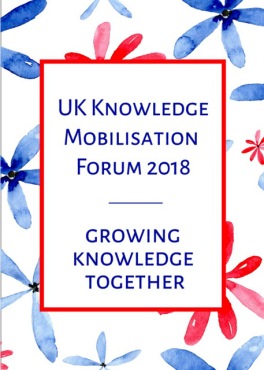This is a reproduction of Vicky’s blog post at www.kmbresearcher.wordpress.com
It’s official – I’ve become an intermittent blogger. Confirmation of this fact comes in my need to start each post with “sorry it’s been a while”! My excuse is that I’ve had rather a lot on my plate recently. An impending move to the University of St Andrews combined with resurrecting and leading the UK Knowledge Mobilisation Forum has made for a busy time. It’s been a steep learning curve but I’ve been accompanied by a fabulous organising team and rewarded by enormous enthusiasm from almost 100 delegates who descended on Bristol in March for 2 days of all things knowledge mobilisation. If you want to get the lowdown on what we got up to head over to our website (www.knowledgemobilisation.net) or check out the hashtag #KMb2018 on Twitter.
 Now, on with the blog! This post (and it’s intriguing title) were inspired by our keynote presentation at the 2018 UK KMb Forum. This was given by Dez Holmes, the Director of Research in Practice and Research in Practice for Adults. Her work focuses on helping and supporting social care organisations and those who work in them to draw on research and other forms of knowledge and evidence in their practice. Dez focused on the barriers and enablers to evidence informed practice and whilst many of her insights were familiar, one really struck me. This was the Japanese concept of ‘ikigai’ (pronounced Ick-ee-guy), which translates as our ‘reason for being’. It’s our ‘ikigai’ which gives us a reason for jumping out of bed in the morning and is believed to bring happiness and fulfilment. According to those who are more familiar with the concept we find our ‘ikigai’ at the intersection of what we value, what we are good at and what we love doing.
Now, on with the blog! This post (and it’s intriguing title) were inspired by our keynote presentation at the 2018 UK KMb Forum. This was given by Dez Holmes, the Director of Research in Practice and Research in Practice for Adults. Her work focuses on helping and supporting social care organisations and those who work in them to draw on research and other forms of knowledge and evidence in their practice. Dez focused on the barriers and enablers to evidence informed practice and whilst many of her insights were familiar, one really struck me. This was the Japanese concept of ‘ikigai’ (pronounced Ick-ee-guy), which translates as our ‘reason for being’. It’s our ‘ikigai’ which gives us a reason for jumping out of bed in the morning and is believed to bring happiness and fulfilment. According to those who are more familiar with the concept we find our ‘ikigai’ at the intersection of what we value, what we are good at and what we love doing.
Dez’s insight was that in order to help people to use evidence in their practice, we need to speak to their ‘ikigai’. We need to understand where they are coming from, what makes them tick, and what they value. This involves forming relationships and ongoing conversations – we simply can’t rely on passively disseminating our own knowledge and evidence in the hope that some of it sticks.
 For me, the concept of ‘ikigai’ went deeper. I started thinking about my own ‘ikigai’ as a knowledge mobiliser. What do I value, what am I good at and what do I love doing? And how can I use that in my work as a knowledge mobiliser? Reflecting on this, and looking round at my fellow knowledge mobilisers I realised that my ‘ikigai’ was epitomised by the Forum itself. Bringing people together, facilitating connections and conversations, supporting and encouraging people to share what they know with each other are my reasons for being. This powerful insight gave me a renewed enthusiasm for my work, and, importantly, another way to communicate my work to others.
For me, the concept of ‘ikigai’ went deeper. I started thinking about my own ‘ikigai’ as a knowledge mobiliser. What do I value, what am I good at and what do I love doing? And how can I use that in my work as a knowledge mobiliser? Reflecting on this, and looking round at my fellow knowledge mobilisers I realised that my ‘ikigai’ was epitomised by the Forum itself. Bringing people together, facilitating connections and conversations, supporting and encouraging people to share what they know with each other are my reasons for being. This powerful insight gave me a renewed enthusiasm for my work, and, importantly, another way to communicate my work to others.
But perhaps the concept of ‘ikigai’ shouldn’t just be applied by and to individuals. What if we applied it to ourselves as a community of knowledge mobilisers? What is it that we value, what are we good at and what do we love doing? Asking these questions might help us not only to develop our community of practice, but to work out where we fit into the world. Perhaps these are questions worth exploring at #KMb2019. I hope to see you there!
